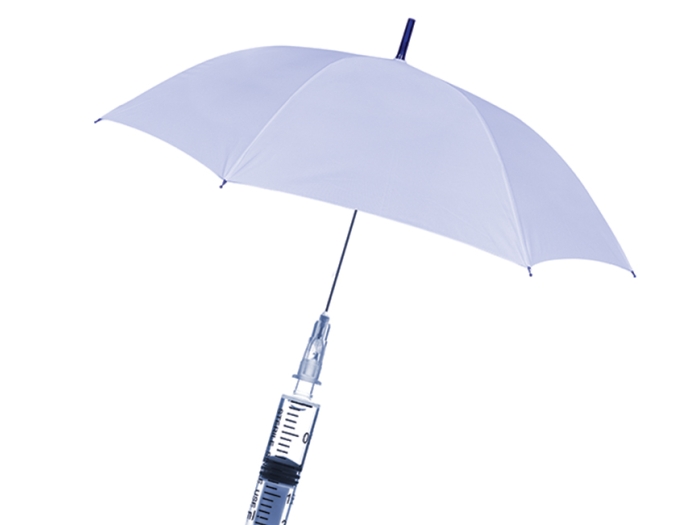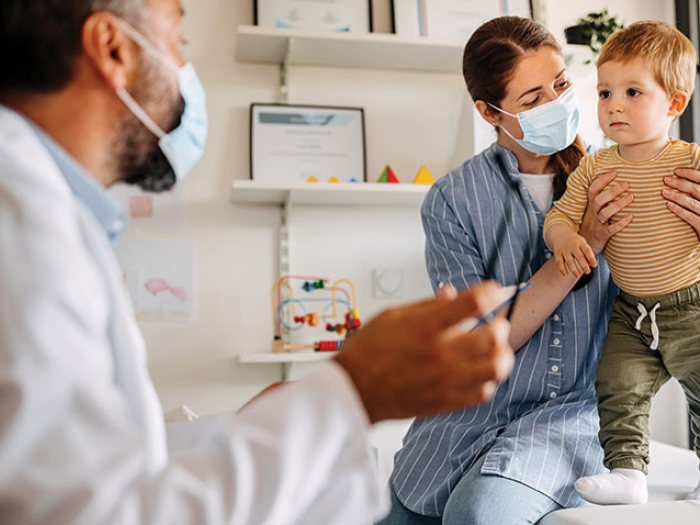Infectious disease specialists answer questions about the measles vaccine for adults and children
4:00 PM
Author |

Measles was declared eliminated in the U.S. in 2000, but clusters of cases have begun popping up across the country.
In February, Michigan reported its first case since 2019. As of late July 2024, the U.S. has seen more than three times as many measles cases in this year as it did in all of 2023, according to the CDC.
With active global measles outbreaks and falling vaccination rates in the U.S., many may be wondering how they can stay protected.
Measles is highly contagious, says Laraine Washer, M.D., professor of internal medicine and medical director of infection prevention at University of Michigan Health. Nine out of 10 people who do not have measles immunity due to vaccination or prior infection will develop measles if they are exposed. Outbreaks, she notes, happen when a measles case occurs within a setting where there are many unvaccinated people.
The disease can lead to severe complications, including pneumonia and encephalitis, and for some, even be life threatening.
The good news is that the measles, mumps and rubella (MMR) vaccine is highly effective, Washer says.
But some questions may remain unclear: How long does a measles immunization protect you? Is a booster shot recommended after a certain number of years? When should kids get vaccinated and what if a child is immunocompromised?
Washer and Terri Stillwell, M.D., M.P.H., a pediatric infectious disease expert and associate hospital epidemiologist at U-M Health C.S. Mott Children’s Hospital, answer the top questions about measles immunization and prevention.
Can you still get measles if fully vaccinated?
Washer: This is quite rare. While it is possible, it’s highly unlikely that you would contract measles if you’re vaccinated, especially if you are fully vaccinated. The MMR vaccine is 93% effective after the first dose, and 97% effective after the second dose.
If a person is vaccinated and does happen to get measles, they are more likely to have a mild case of the illness. It’s still important to contact your health care provider, but you should expect less severe symptoms than those who are unvaccinated.
Should adults consider a booster shot?
Washer: It isn’t necessary to get a booster shot if you’re fully vaccinated with two doses of the MMR vaccine. The vaccine provides lifelong protection in most cases. Even in the onset of an outbreak, it isn’t recommended to receive a booster. Although there aren’t significant risks to receiving an extra dose for most individuals, there also aren’t any evidence based benefits.
What should you do if you are unvaccinated or unsure of your vaccination status?
Washer: If you are unvaccinated or undervaccinated, the answer is simple: go to your health care provider and receive the proper dosage of the MMR vaccine. We highly recommend that people who aren’t fully vaccinated complete their vaccination cycle, especially if they’re planning international travel.
Adults who have never been vaccinated should get two doses of the vaccine separated by at least 28 days. Undervaccinated individuals, meaning those who have only ever received one dose of the vaccine, will only require one more dose to complete their immunization. This is especially important for people who are at higher risk for measles, such as health care workers or people travelling internationally.
If you are unsure of your vaccination status and unable to track down medical records, another option is to get a blood test for antibodies. These results will help you determine your immunity status and if any action is necessary. People born prior to 1957 are generally considered immune.
Are there any circumstances where adults shouldn’t get vaccinated?
Washer: The MMR vaccine is a live attenuated vaccine. This means the pathogen remains active and alive but is modified so that it does not cause infection. Due to the nature of this vaccine, people who are pregnant or immunocompromised should not receive any doses while these risk factors are present.
If you’ve had measles before, is a vaccination necessary?
Washer: If a person has had measles, and the diagnosis is confirmed by a health care provider, they are considered immune for life and a vaccination is not necessary.
Additionally, people born before 1957 are presumed to have been infected naturally and protected against the virus. Before the first measles vaccine was licensed in 1963, there were measles epidemics that infected large amounts of the population. It’s estimated that 95 to 98% of people born before 1957 are immune.
Are the children of vaccinated mothers protected from the virus at birth?
Stillwell: Full term infants of vaccinated mothers are typically protected at birth by acquiring maternal antibodies. This immunity wears off over a period of months depending on the number of antibodies transferred and the gestational age of the baby at birth.
When should kids get vaccinated?
Stillwell: The current recommendation includes a two dose vaccine series, with the first dose from ages 12 to 15 months and then the second dose from ages four to six years. For infants who might be traveling internationally to a country where measles might be present, the vaccine can be given as early as six months. But if a dose of vaccine is given prior to 12 months of age, a child will still need the recommended two dose series starting at 12 months of age.
The MMR vaccine is covered by most health insurances, but there is also the Vaccines for Children Program that funds no-cost vaccines to children of families that lack health insurance or cannot afford the cost.
What can the parents of children younger than the recommended MMR vaccination age do to protect their child?
Stillwell: Ideally, you want to try to keep your child away from individuals who are sick. Of course, that is easier said than done. Try your best to limit your child’s exposure to large crowds. It can also help to inquire into the vaccination recommendations or requirements for places where your child may regularly be, such as at daycare or school.
How can children who have compromised immune systems and are ineligible for the vaccine stay safe?
Stillwell: In this scenario, it’s important for parents to assess those in close contact with their child, so that you can try to provide a protective environment as best you can. It’s reasonable to evaluate vaccination status when choosing babysitters, daycares or schools. It’s also important to be aware of any potential exposures that may have occurred and address the concern immediately with your health care provider.
What should you do if your child contracts measles?
Stillwell: Parents should contact their child’s pediatrician and alert them to a measles concern. This allows the pediatrician to take the appropriate actions to prevent spread when you come into the office. Measles is confirmed with a blood test that looks for early antibodies, as well as by a throat swab. Once the child is diagnosed, one of the key objectives is to prevent transmitting the virus to others.
There is no specific antiviral treatment for measles once it has occurred. Parents can offer supportive care with fever reducing medications, keeping their child hydrated and watching out for severe symptoms and complications.
These include difficulty breathing, which might indicate pneumonia, or changes in alertness or mental status. Remain in close communication with your pediatrician for any questions or concerns.
Sign up for Health Lab newsletters today. Get medical tips from top experts and learn about new scientific discoveries every week by subscribing to Health Lab’s two newsletters, Health & Wellness and Research & Innovation.
Sign up for the Health Lab Podcast: Add us on Spotify, Apple Podcasts or wherever you get you listen to your favorite shows.

Explore a variety of health care news & stories by visiting the Health Lab home page for more articles.

Department of Communication at Michigan Medicine

Want top health & research news weekly? Sign up for Health Lab’s newsletters today!





